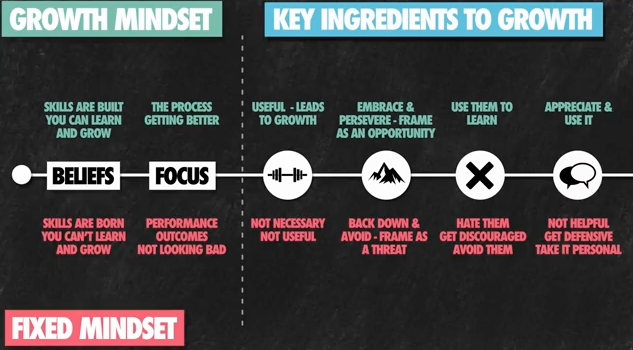Carol Dweck, professor of psychology at Stanford University, has done extensive research and writing on “fixed” versus “growth” mindset. She differentiates them this way: “To briefly sum up the findings: Individuals who believe their talents can be developed (through hard work, good strategies, and input from others) have a growth mindset. They tend to achieve more than those with a more fixed mindset (those who believe their talents are innate gifts). This is because they worry less about looking smart and they put more energy into learning.
Fixed mindset triggers occur when students face challenges or criticism or perform poorly in comparison with others. You’ll know this is happening if you feel insecure or defensive. Moreover, students for whom performance is paramount, looking smart is critical, even if they don’t learn a thing.
On the other hand, if you are in a growth mindset, you will find yourself collaborating, sharing information, seeking feedback, and admitting errors. A growth mindset encourages risk-taking without worrying about failure because mistakes represent a chance to learn.
Read more about common misperceptions of a growth mindset.
Here's an excellent video summary of the growth/fixed mindset spectrum:
Academic tenacity is a term for non-cognitive factors that promote long-term learning and achievement. In a report for the Bill and Melinda Gates Foundation, Dweck and colleagues Gregory M. Waltonand Geoffrey L. Cohen identified the following characteristics of academic tenacity. These learners:
- Believe that they belong in school academically and socially. School is part of who they are and is seen as a route to future goals, such as providing for their families or contributing to their community or society.
- Are engaged in learning, view effort positively, and can forego immediate pleasures for the sake of schoolwork. For example, they seek challenging tasks that will help them learn new things, rather than tasks in their comfort zone that require little effort, but also provide little opportunity to learn.
- Are not derailed by difficulty, be it intellectual or social. They see a setback as an opportunity for learning or a problem to be solved rather than as a humiliation, a condemnation of their ability or worth, a symbol of future failures, or a confirmation that they do not belong. This is true in the case of a specific assignment as well as with their studies in general.
- Know how to remain engaged over the long haul and how to deploy new strategies for moving forward effectively.
So how do you foster a growth mindset in yourself? For a start,
- Acknowledge and embrace imperfections.
- Follow the research on brain plasticity.
- Replace the word “failing” with the word “learning.”
- Value the process over the end result.
- Emphasise growth over speed.

